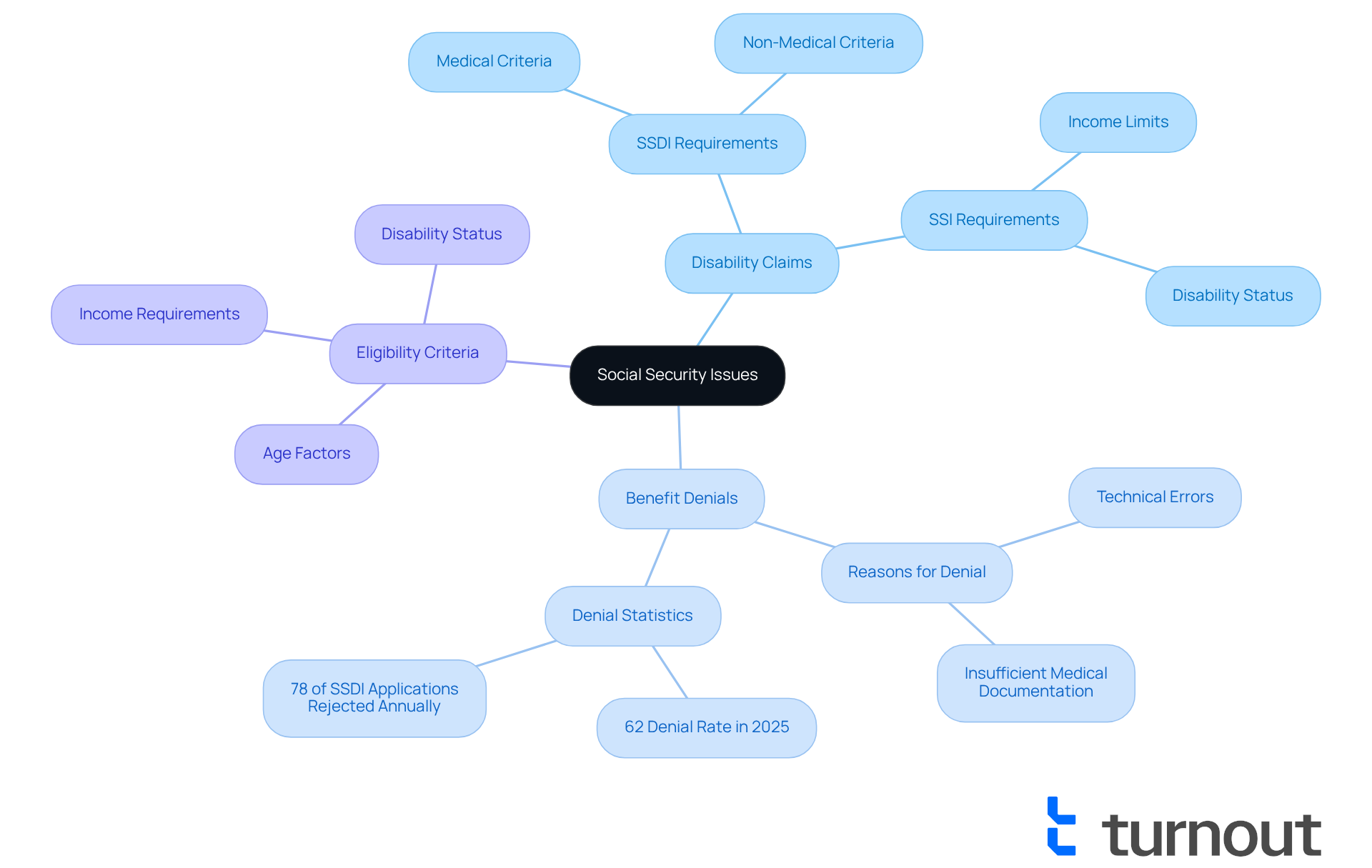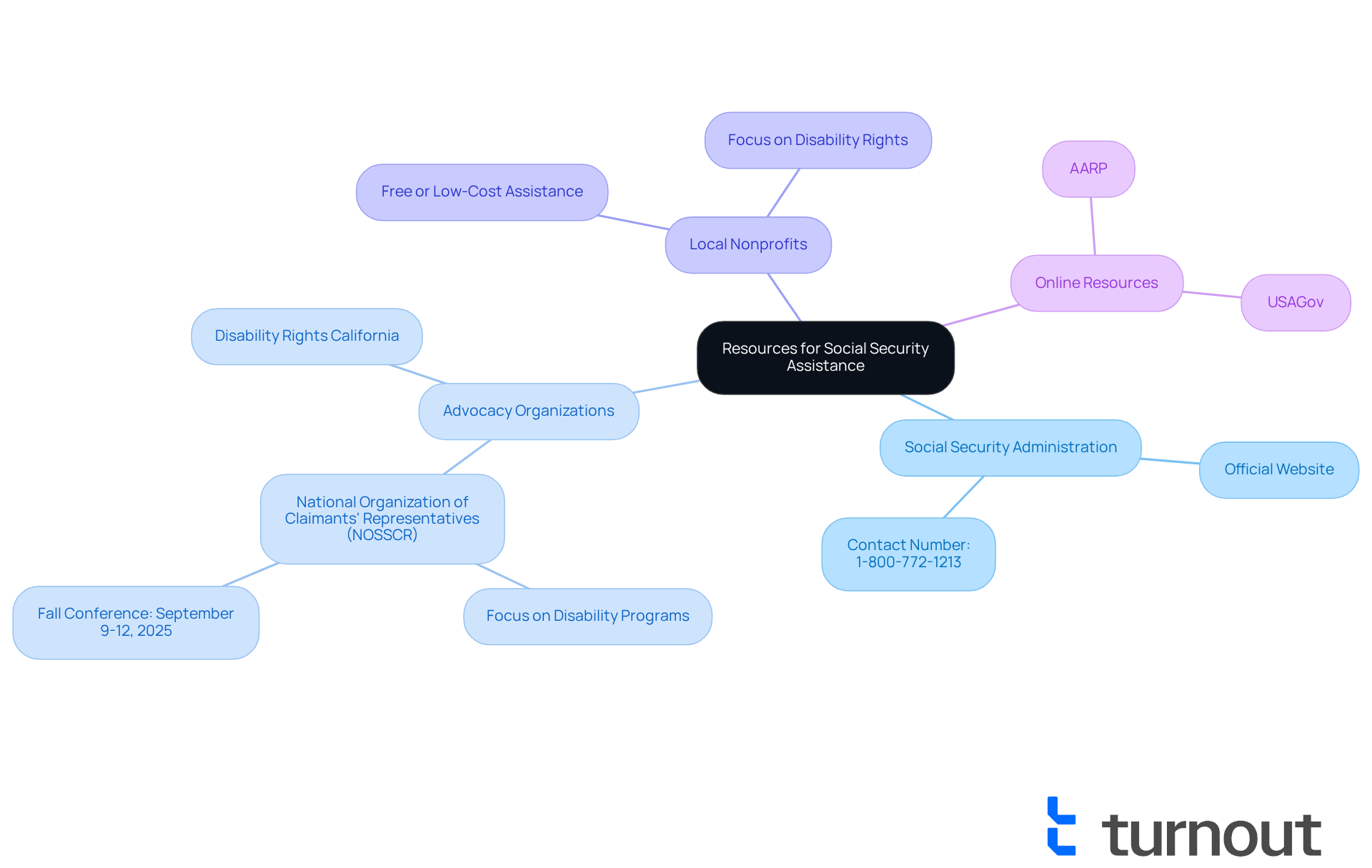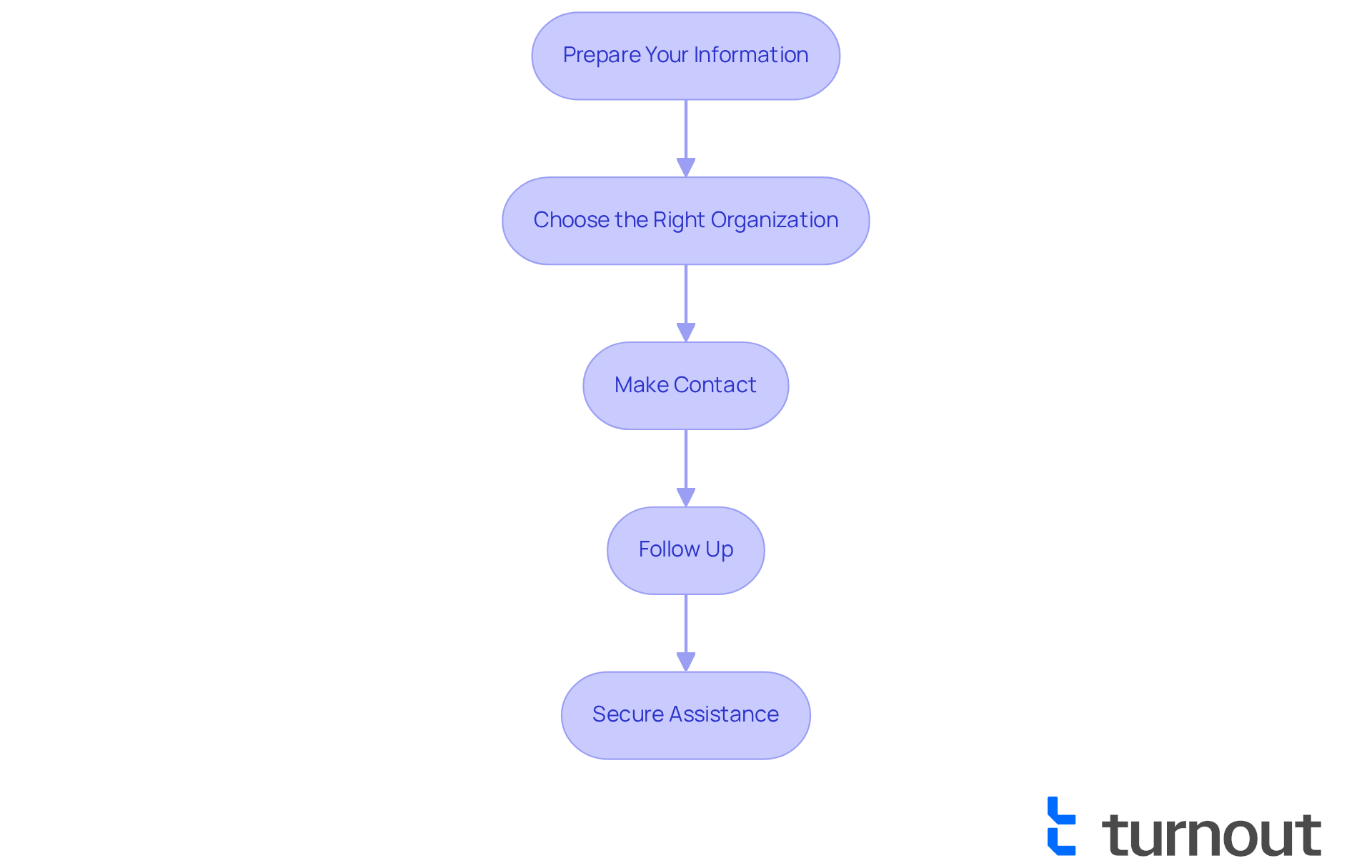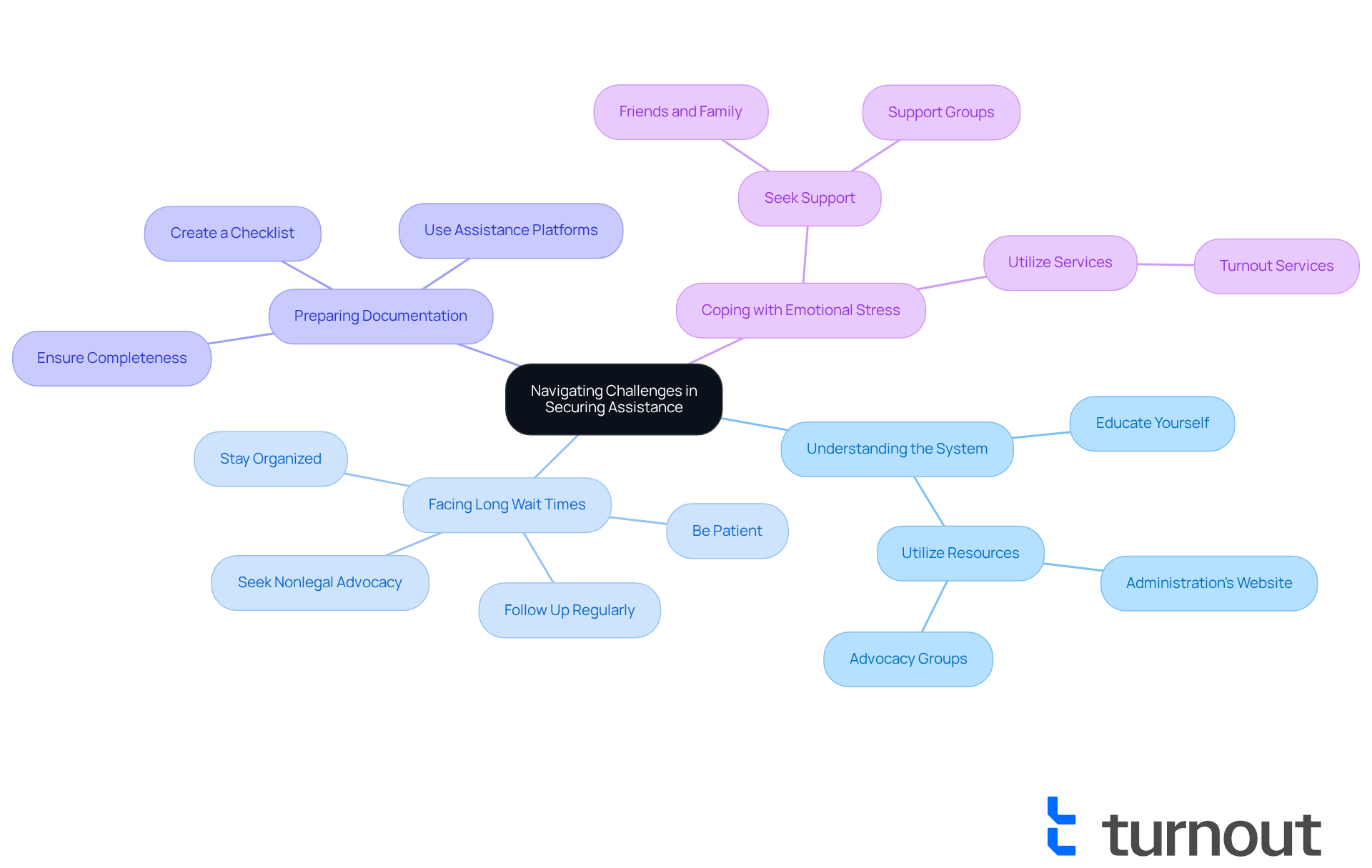Overview
Navigating Social Security issues can be overwhelming, and it's important to know that help is available. This article is dedicated to guiding you through the process of finding the support you need. We understand that challenges such as disability claims and benefit denials can be particularly daunting.
To address these concerns, we outline essential steps to connect with resources that can provide assistance:
- Organizations like the Social Security Administration
- Advocacy groups
- Local nonprofits
These organizations are here to offer guidance throughout your journey. Remember, you are not alone in this experience.
As you seek help, it’s common to feel uncertain or anxious. Acknowledging these feelings is the first step towards finding the support you deserve. We encourage you to explore the resources available, as they can make a significant difference in your situation.
In conclusion, reaching out for assistance is a brave and important step. We’re here to help you navigate this process, ensuring you have the support and information necessary to move forward with confidence.
Introduction
Navigating the complexities of Social Security can feel overwhelming. Many individuals, just like you, face challenges ranging from disability claims to benefit denials. Understanding the landscape of available support is essential for those seeking assistance. The stakes are high, and the processes can be intricate. What resources are available to help you overcome these challenges? How can you connect with the right advocates?
This guide is here to walk you through the essential steps for identifying and reaching out to the right support systems. We understand that no one should have to face the Social Security maze alone. Together, we can explore the pathways to the assistance you need.
Understand Your Social Security Issues
To effectively address your concerns about benefits, it's important to first recognize the specific challenges you may be facing. We understand that navigating this process can be overwhelming, and common issues include:
- Disability Claims: It's crucial to understand the criteria for Social Security Disability Insurance (SSDI) and Supplemental Security Income (SSI). Familiarizing yourself with both medical and non-medical requirements can significantly impact your application. Remember, participation offers access to skilled non-legal representatives who can guide you through these complexities without the need for legal representation. Importantly, this organization is not a legal practice and does not provide legal guidance.
- Benefit Denials: If your application has been denied, understanding the reasons behind the denial is essential. In 2025, about 62% of SSDI claims were denied at the initial application stage, often due to technical errors or insufficient medical documentation. Overall, approximately 78% of SSDI applications face rejection each year, highlighting the systemic challenges applicants encounter. By understanding these reasons, you can navigate the appeals process more effectively with the support of their representatives.
- Eligibility Criteria: It's important to learn about the eligibility requirements for different types of benefits, including age, income, and disability status. For instance, the Social Security Administration (SSA) considers age a significant factor, especially for older applicants who may find it more challenging to adjust to new work.
Gathering relevant documents such as medical records, work history, and any previous correspondence with the SSA is a vital step. Turnout's supporters are here to help you with this preparation, ensuring you can express your situation clearly when seeking assistance. As advocates in the field often say, "Building a strong case with substantial medical evidence supporting your claim gives you a good chance of securing disability benefits." Understanding these elements is crucial for enhancing your chances of a successful outcome. Remember, you are not alone in this journey, and we're here to help.

Identify Available Resources for Assistance
Once you grasp your benefits concerns, we understand that the next step can feel overwhelming. Identifying resources, including those who can help with social security issues, is crucial. Here are some key resources that can help you navigate this journey:
- Social Security Administration (SSA): The SSA's official website offers comprehensive information about benefits, eligibility, and application processes. You can also reach out to them directly at 1-800-772-1213 for personalized assistance from representatives who can help with social security issues.
- Advocacy Organizations: Groups like the National Organization of Claimants' Representatives (NOSSCR) and Disability Rights California provide vital support and guidance for individuals who can help with social security issues. Specifically, NOSSCR promotes enhancements in disability programs, ensuring that you have access to qualified support and fair decisions.
- Local Nonprofits: Many local organizations offer free or low-cost assistance with applications and appeals. It's worth investigating nonprofit organizations in your area that focus on disability rights and advocacy for social welfare, particularly those who can help with social security issues. These organizations often provide tailored support from professionals who can help with social security issues, addressing local challenges and helping individuals achieve successful outcomes.
- Online Resources: Websites such as AARP and USAGov offer valuable information and tools to help you understand your benefits and rights. These platforms are especially beneficial for staying informed about changes in social welfare policies and advocacy initiatives.
We encourage you to compile a list of these resources, including contact information, to streamline your outreach efforts. With the current workforce of the SSA at a 50-year low and plans to reduce around 7,000 positions, it is more essential than ever to have dependable assistance from those who can help with social security issues to manage the intricacies of claims. Remember, you are not alone in this journey; we’re here to help you every step of the way.

Contact Advocates and Organizations for Support
After identifying the resources available, we understand that reaching out for support can feel daunting. Here’s how to effectively contact advocates and organizations:
- Prepare Your Information: Before you reach out, gather all relevant details about your case. This includes your Social Security number, specifics of your disability, and any previous correspondence with the SSA.
- Choose the Right Organization: Depending on your unique situation—like disability claims or benefit denials—select an organization that specializes in that area. For instance, if you need help with a disability claim, consider contacting an organization with trained non-legal representatives who can help with social security issues and offer support for tax debt relief.
- Make Contact: Reach out via phone or email. Be clear and concise about your situation, and ask specific questions about how they can assist you. If possible, request a consultation to discuss your case in detail. Remember, the supporters of the initiative are ready to help you navigate the complexities of the SSD process without providing legal representation.
- Follow Up: If you don’t hear back within a week, a polite reminder can go a long way. Persistence is often key in securing the help you need. Disability Rights Wisconsin encourages individuals to be proactive in their advocacy efforts, especially as funding for essential services is currently at risk.
By following these steps, you can successfully manage the intricacies of social welfare matters and connect with groups like Turnout that can provide the assistance you need. You're not alone in this journey; we're here to help.

Navigate Challenges in Securing Assistance
Navigating support for social welfare matters can indeed feel overwhelming. Many individuals encounter common obstacles, but there are strategies to help you through them.
-
Understanding the System: The Social Security system is complex, and it’s understandable to feel lost. Educating yourself about the processes is essential. Resources like the Administration's website and advocacy groups can clarify uncertainties and enhance your understanding of your rights and options. They also provide tools and services to help you manage these complexities, especially regarding SSD claims.
-
Facing Long Wait Times: It’s common to experience significant delays when waiting for responses from the Social Security Administration (SSA) or related organizations. In 2025, over 1 million initial disability claims are pending, nearly double the number from 2019. While patience is vital, you can take proactive steps to mitigate delays by following up regularly and keeping your inquiries organized. Remember, trained nonlegal advocates who can help with social security issues can support you in this process, facilitating progress in your case.
-
Preparing Documentation: Having all necessary documentation ready is crucial. Missing documents can lead to frustrating delays in your application or appeal process. Consider creating a checklist of required documents specific to the benefits you are applying for. Many applicants face documentation issues, complicating their claims. Thankfully, platforms exist to assist you in navigating this process, ensuring you have everything you need.
-
Coping with Emotional Stress: Managing benefits issues can take an emotional toll. Seeking support from friends, family, or support groups can help you manage stress and maintain motivation. Remember, you are not alone in this journey; many individuals share similar experiences. Utilizing services like Turnout, which are designed for those who can help with social security issues, can provide additional support and guidance, helping to alleviate some of this stress.
It’s important to note that this organization does not provide legal guidance. By anticipating these challenges and preparing accordingly, you can enhance your ability to secure the assistance you need and navigate the complexities of the Social Security system with greater ease.

Conclusion
Navigating the complexities of social security issues can be overwhelming, and understanding these challenges is crucial for anyone seeking benefits. We recognize the specific hurdles you may face, such as disability claims, benefit denials, and eligibility criteria. It’s important to know that you have resources and support available to guide you through this process. By connecting with the right organizations and advocates, you can manage your claims more effectively and improve your chances of securing the benefits you deserve.
Key insights reveal:
- A high rate of benefit denials
- The necessity of gathering proper documentation
- The emotional toll that social security navigation can impose
Resources like the Social Security Administration, advocacy organizations, and local nonprofits are vital support systems, offering tailored guidance and assistance. Moreover, proactive communication and organization can significantly ease the stress of long wait times and complex procedures.
Given the challenges many face in securing social security benefits, it’s essential to seek the right support and resources. Take the initiative to reach out to organizations and advocates who specialize in social security issues. This will ensure you are well-informed and prepared. Remember, you are not alone in this journey; there are dedicated individuals and organizations ready to help you navigate the intricacies of social security and advocate for your rights.
Frequently Asked Questions
What are the common issues faced when dealing with Social Security benefits?
Common issues include challenges with disability claims, benefit denials, and understanding eligibility criteria.
What should I know about disability claims for Social Security?
It's important to understand the criteria for Social Security Disability Insurance (SSDI) and Supplemental Security Income (SSI), including both medical and non-medical requirements.
What happens if my SSDI application is denied?
If your application is denied, it's essential to understand the reasons behind the denial. In 2025, about 62% of SSDI claims were denied at the initial stage, often due to technical errors or insufficient medical documentation.
What percentage of SSDI applications are rejected each year?
Approximately 78% of SSDI applications face rejection each year, indicating systemic challenges for applicants.
How can I improve my chances of a successful SSDI application?
To enhance your chances, gather relevant documents such as medical records, work history, and any correspondence with the Social Security Administration (SSA). Building a strong case with substantial medical evidence is crucial.
What factors does the SSA consider for eligibility?
The SSA considers factors such as age, income, and disability status when determining eligibility for benefits.
Are there resources available to help with the application process?
Yes, there are skilled non-legal representatives available to guide you through the complexities of the application process without the need for legal representation.
What role do advocates play in the Social Security application process?
Advocates help you prepare your application and ensure you can clearly express your situation, which is vital for securing disability benefits.




